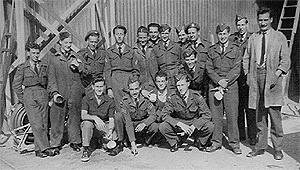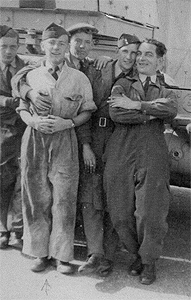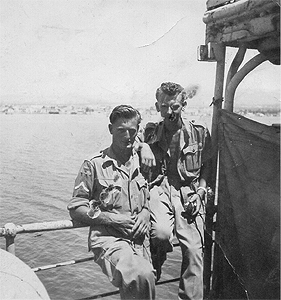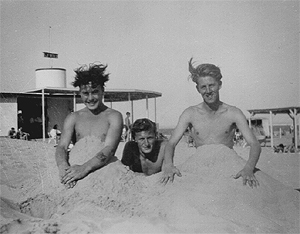
Outside the Tin Shop

Crane Section

With Ginger Burton on leave in Cyprus

At the Blue Lagoon
CRANE SECTION, 9 MTBD EL FIRDAN 1950-53
As Remembered By Norman J. Dawkins
I was at El Firdan, 9 MTBD, on the Crane Section,
periodically going to all RAF Camps load testing and repairing where needed.
When the Aberdan Crisis erupted I was sent on attachment to Fayid. The crane
was being used for loading and unloading the York and Hastings aircraft –
one day it was seats for the Paras, the next it was for supplies.
Outside the Tin Shop |
Crane Section |
With Ginger Burton on leave in Cyprus |
At the Blue Lagoon |
I thought that at least now I would be in proper sleeping accommodation but I was wrong. I was shown to a solitary tent directly behind the flag pole by the side of the Parade Ground, with no lockers and no light! This was on a Friday night and the next morning I was awakened to the sound of bagpipes. As I peered out of the tent all I could see was the back of the CO taking the salute for the camp parade.
On Monday morning I reported to the MT Section and the first job I was given was on the coach that conveyed passengers to the Customs Shed. Apparently, it kept breaking down and no-one could discover why. On taking it for a run, it did break down and, more by luck than skill, I happened to look under the dashboard and discovered a loose ignition wire. The Chiefy was certainly impressed – so much so that later that afternoon he told the DPM i/c Police & Customs about it. Apparently the DPM had a Citroen car that everybody had had a go at trying to get it started and now he wanted me to look at it. So every afternoon the police Land Rover would pick me up from my tent and take me to his house in the married quarters in Abyad. I would then work on his car for about an hour and then his wife would come out with a pint of John Collins (with plenty of ice!) for me – after two of those I wasn’t in a fit state to work on anything so I would then go in an help his wife to prepare dinner which I shared with them.
Whilst I was there he bought a Bendix semi-automatic washing machine which arrived in bits so had to be constructed and then bolted to the floor. We managed to get to together and he couldn’t wait to try it out so we switched it on and off it went. All was fine until it reached top speed and it started to rock and then took off from side to side. I often smile when I think of the vision of that officer, an Irish gentlemen who was short and quite fat, leaping across this machine which did temporarily stabilise before taking off again and there he was, wobbling like a jelly, trying to stop it.
Back at Fayid, the ground crews of
the transport plane had arrived and more tents were erected by mine and I now
had to share my tent with some of them.
At French Square, Ismailia 1951 |
Homeward Bound |
I did apply for a permanent posting there but it wasn’t granted so it was back to El Firdan and, just in case you are wondering, I did get the DPM’s car going but the carburettor was u/s and we couldn’t get another one.
Bob Marriott queried the name of the bar run by two ex-WRAC ladies. It was the “Moo Cow” in Fayid.
In 1951, at El Firdan, when all the native labour left, we were all detailed such jobs as emptying the toilet buckets etc. I, along with two others, were detailed to empty all the dustbins – NAAFI empties etc. and take all the rubbish to a site just a little further on past the rifle range.
My friend, “Ginger” Burton who normally worked on the Bowsers No. 1 hangar (I was outside assembly and load test on the Loden Crane) was detailed to look after the water supply with one other. At night, they took it in turns to sleep in the hut which had no barbed wire around it – really creepy. The pump supplied the water tower and their job was to add the correct amount of chlorine.
The water often came out of the taps in the toilet block in a black warm nature – one sip was more than enough! Luckily in the hangar we had chatties that were filled up each day but undrinkable for a couple of hours when some evaporation took place.
I remember in 1950 when I went to shower, the pipes were all furred up – cold water on one side and boiling hot on the other. It took ages to shower especially if I had been working underneath a crane and got some grease on my body.
Somehow, and once in a blue moon, we got water melon in the cookhouse and very occasionally they would put two buckets of clear cold water on the tables, so if you happened to be in the cookhouse at the right time, you got some. Washing your greasy plates was done outside in the sand and then rinsed off in the tank of warm water.
For drinks we usually relied on Ali, who came round with a bucket of ice in a straw basket on the handlebars of his bicycle which contained bottles of Coke, pineapple and Vimpto for us to buy.
It was only Stella that
kept me going but even that dried up, leaving us with either Guiness or some
Danish beer. Before the restrictions, I spent many a Saturday or Sunday in the
Hollywood Bar in town, which was on the other side of the avenue and a little
further up than the Blue Kettle. The Hollywood Bar sold good food and, at that
time, the entertainment was a young boy who would sing whilst tapping his tambourine
– he had a very good repertoire of old English songs. There were also
conjurers and a Frenchman, complete with beret, who sat all day drawing caricatures
of the customers. At 10pm we would catch the last gharri back to camp.